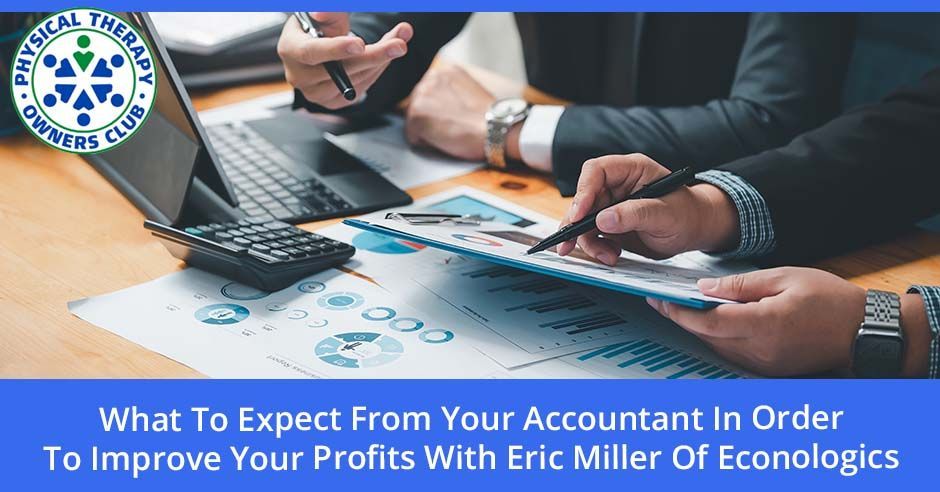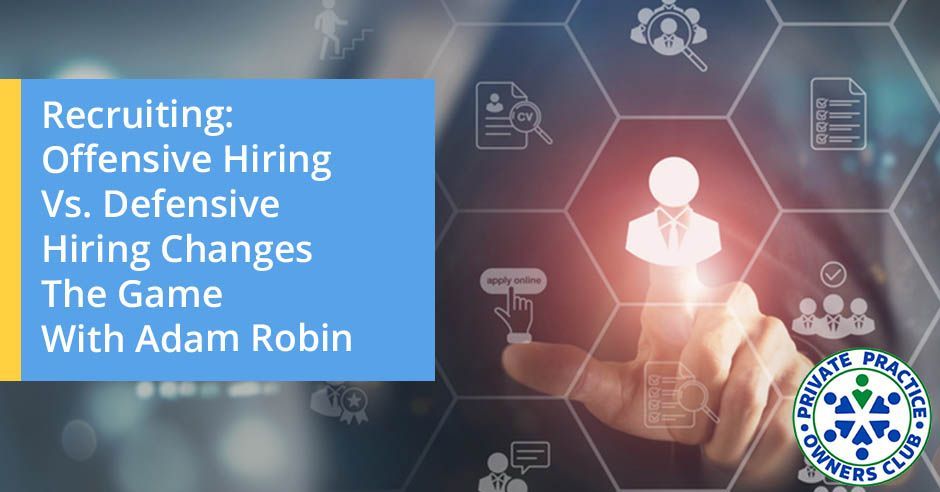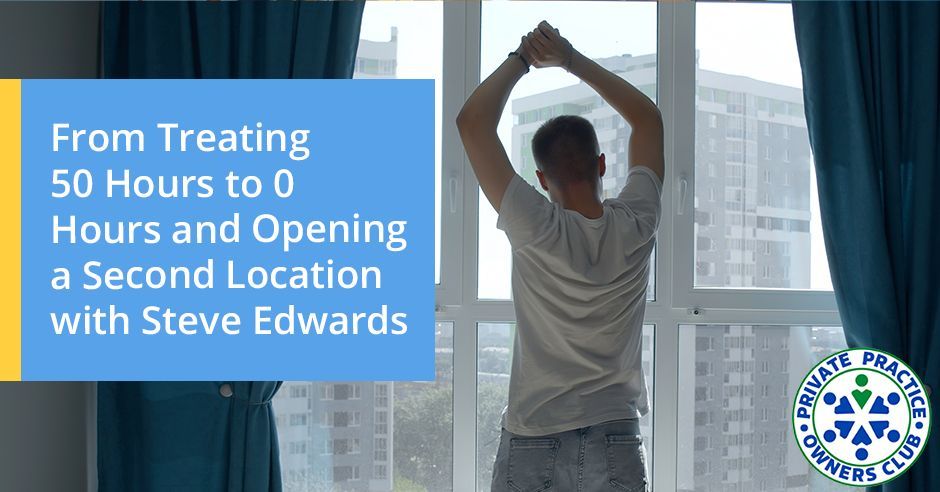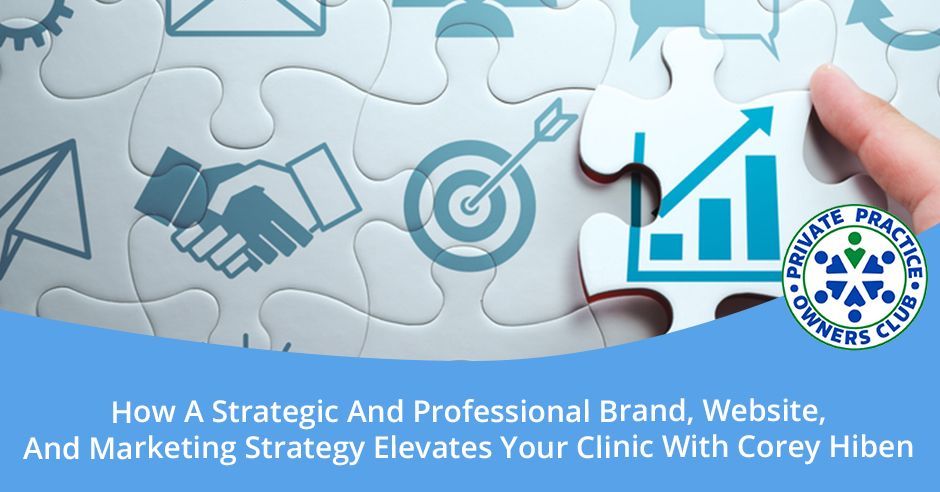What To Expect From Your Accountant In Order To Improve Your Profits With Eric Miller Of Econologics

Managing your money, and keeping more of it, may be the most important thing to do as an owner. Thus, you need to have the right people on your money team—biller, bookkeeper, accountant, financial adviser. It’s easy to find an accountant, but in order to find the right one to work for you, you’ll need to know what to expect, how to request what’s important and filter out the ones who won’t work to save you money (less taxes, please!). Eric Miller of Econologics joins the podcast in this episode to tell us what PT owners should and shouldn’t expect from their accountants and how to leverage them to their benefit (more money, please!).
—
Listen to the podcast here
What To Expect From Your Accountant In Order To Improve Your Profits With Eric Miller Of Econologics
Joining me is everyone’s favorite financial advisor, Eric Miller, from Econologics . Eric, it is good to have you on again.
Everyone’s favorite, I like that.
I hope so. I have you on enough. Hopefully, they don’t hate these episodes.
That’s true.
I‘m getting a little bit lazy, too, because I’m not out beating the bushes for more guests. You’re an easy fallback. You’ve always got good content.
Thanks. We got a pretty interesting topic, too.
I bring this up with every coaching client within the first couple of sessions. That is, “What kind of relationship do you have with your accountant? What are they doing for you? How often are you meeting with them?” If it’s not their father who is an accountant or their father’s accountant who’s running the dad’s business or something like that, then they typically don’t have a great relationship. I’m excited to talk about this with you on what to expect and how to find a good accountant.
You need a team. This area is one that is important that you have someone that you trust. It seems like there’s a disconnect between the relationship that people have with their accountants on what they think they’re doing, what the CPAs are doing, and what their own expectations are. It’ll be fun to get into this.
I have this conversation with owners as well. They should be meeting with their billing people monthly, whether that’s an in-house biller or an outsourced biller. They should be meeting and reviewing billing collections on a regular basis. The difficulty for any owner is they don’t know how to hold their billers accountable or what that meeting should look like, what numbers they should be looking at, and what those numbers mean. They’re coming from a place of ignorance and naivety in the space. They don’t know what to ask for and what to expect from billers and accountants alike. That’s why I’m excited to talk to you.
What I preach to my coaching clients is, “You need to meet with your accountant on a regular basis. These are the things that you need to review. These are the things that you should expect.” They simply have an accountant to monitor the financials, tell them how much I owe at the end of the year, and make sure they’re compliant with taxes. Otherwise, communication is little to none and it should not be that at all.
It should be a completely different relationship than that as well. You also have to throw a bookkeeper in there who may or may not be your accountant. A lot of CPAs do bookkeeping work and such, but some don’t. You may have a separate bookkeeper that does all the entries. Where do you want to start? Is it what an ideal accountant should look like or what the relationship should be?
To be fair, I’m on your email list. I get the posts when your webinars are coming up and what the topics are. When I immediately saw this title, I reached out to you. I was like, “We got to do an episode about this.”
It is fun.
I’m willing to let you guide the conversation here and I’ll interject.
What we are trying to do is we’re trying to avoid paying taxes. That’s certainly part of anybody’s strategy. It is going to be like, “How do I avoid paying taxes?” Here’s a good one, which is the ideal CPA you should be looking for. Let’s start with this one. This is good. Number one, and this is important, your CPA should have experience working with other practice owners in your industry. I’m going to agree with that.

Does it have to be PT-specific or would you say healthcare?
Healthcare in general is fine because they’re going to have a list of practice owners that they work with. It’s similar. It’s a patient-driven model. There are insurance reimbursements. You’re going to have a lot of similar deductions, expenses, and everything else. Having someone that understands what that looks like is pretty key that your CPA has some background in working with healthcare practice owners. The other one is a CPA should have access to additional resources to help you lower your tax bill. Most of them don’t necessarily see themselves as tax “planners.” They look at themselves more as preparers.
They should have some resources for you to say, “If you want to lower your tax bill, let me get you in connection with some tax strategists that have combed the tax code and have a couple of things here that you can look at and do. You can do an evaluation to see if it works.” A simple one is if you own a piece of commercial real estate, it is doing cost segregation against that piece of real estate so you can accelerate the depreciation. I talk to people all the time and ask, “I’m assuming that your accountant has told you how to do this.” They’re like, “No.” I’m like, “Really?”
You don’t expect that much out of them.
Exactly. They’re not there. They should help you understand your taxes. They should be responsive. They should call you back like you guys would call people back, too. I don’t know why it’s a lost service of calling people back. You have to meet regularly with them because you need some prediction of how much you should be setting aside and what your profit margins are so you know how much you pay in tax. The practice creates a tax liability for you personally. The practice creates a profit that then creates a tax liability for the household.
Unless you’re meeting with your CPA and your team regularly and you enjoy getting that call on April 14th that says, “You only owe $45,000 this year. How would you like to pay that?” You have to meet with them regularly every quarter. You’re like, “What are our profit margins looking like? How much should I be adjusting to set aside in my tax account so that I can make sure that come April, I have enough? If we’ve done a good job of planning, then hopefully, the amount that you asked me to pay is less than what I have in my account. I win.” That’s the kind of relationship that I would like to see people have with their accountants where it’s a regular quarterly meeting, at least. You guys are going over things that are related to planning. That, to me, is important when you’re looking at the relationship.
Something I learned early on probably midway through my ownership of the clinics is I didn’t know what a financial statement was. I didn’t know how to read a profit and loss statement or a balance sheet. Based on some people asking me simple financial questions, I thought, “I should know these things.” I told my CPA, “I need to meet with you monthly and review this so you can teach me how to read a profit and loss statement, how it works, what it means, the balance sheet, you name it.” That’s something that I took from that CPA to the next CPA. I recommend all owners do the same thing. If not with the CPA themselves, it’s with the bookkeeper that’s manning all the transactions, right?
Yes.
That’s because I’m at a point where I don’t meet with my CPA so often. I meet with my bookkeeper, for sure, and review all the accounts on a monthly basis at least and have questions in between.
It’s probably not as complex anymore as it was when you owned the practice. That’s true. It does get to a point where you probably don’t, but when you’re owning it, you do need to meet with them regularly. Here’s something that shows the difference between a prepared accountant and then someone that’s planning. Most PTs have a relationship where they prepare taxes and financial statements. They answer their questions. You sometimes cringe when you leave because you probably had that, like, “I spent an hour in there and I don’t know that I learned anything at all.” That’s what most people’s relationship is like with their accountant.
What it should be is obviously they should be doing some planning. This is where if they understand your industry, they know what’s coming. They’re like, “I know that you’re probably going to have to expand here in the next maybe 1 to 2 years. I know that you’re interested in trying to minimize your tax liability, but you may need to buy a building. I need to make you look like you’re financially okay to do this, so we need to make some adjustments.” That’s what a planner does. It is someone that is doing some tax planning. They look at it from that perspective.
If your accountant understands your industry, they know what's coming.
Click To Tweet
Are you recommending that an accountant also have some services that are like a planner, or are you recommending that there be an accountant and a separate advisor for tax planning?
They should do both. These things are fairly easy to do. Preparing statements and those things isn’t that hard. It’s knowing the compliance and the basics, but then building a tax plan of how we can minimize your effective tax rate, know your numbers, and make sure that you’re building this practice so that it has value to it, especially when you want to transition as well. They’re being strategic. As opposed to being reactive, they’re being proactive.
Those are the conversations that I typically had with my accountant on a monthly basis. It’s not just the review of the financials, but a comparison to the previous month or previous year. At the end of the year, he would provide a proforma or a budget for the upcoming year based on a certain percentage of growth. I’m like, “Are we measuring up to those metrics?”
I’d then have questions like, “I’m looking to add a PT. What does that do to my financials? If I add that salary and those benefits in there, now what does that look like? How many visits now do I need to see in order to cover that expense and make a profit?” Those conversations would come. That’s not a bad way for you to guide the conversation and get more out of your accountant if you are simply asking those questions during the course of the meeting.
Here’s a list of what tax planning encompasses. This is what your relationship should be like with your accountant. Certainly, they’re helping you with what kind of entity should you have.
As core groups and as partnerships.
They should give you some basic guidance on that. If you’re looking to lease or buy equipment or things like that, they should give you guidance on that. Deduction stacking is a technique of maybe taking deductions in one year or pre-paying for some expenses. Let’s say you’re going to have a big tax bill. They’re like, “We’ll double pay on some of our expenses for this year so we can help minimize that liability.” That’s all part of tax planning. Real estate and business health analysis should be interested in your business as well. Are you budgeting and cashflow planning? These are some things that a good tax planner would help you with. It’s not a transactional relationship where once a year, we’re going to go over all your forms and that’s pretty much it.
We’d have plenty of conversations about, “What’s my quarterly tax payment? Coming up, what should I expect? How much should I expect to pay?” He’d say, “Based on what we’re seeing so far this year, you’d probably need to be about in this range. Traditionally, you’re busier in the third quarter, so you might want to make sure you’re setting aside for that as well.”
There are a number of horror stories that I have to hear on a weekly basis about this relationship. I don’t think you should feel worse when you walk out of your accountant’s office and be like, “This is all I have.” The worst thing, too, is that I see it as lazy tax planning. I’ll bring that up quickly. These are some things that I tend to tell people to do. Number one, if you don’t do anything at all and you sit back, hope, and pray, then you’re going to pay the most in taxes. Unfortunately, I’ve had people that have had to go into debt to pay their taxes, which is never a good thing. If you’re having to revolve and always go into debt every year, then that’s probably a bad thing.
If you don't do anything, you're going to pay the most.
Click To Tweet
There is a metric called your effective tax rate. That’s the total amount of tax that you paid compared to your adjusted gross income. I’d like to see that under 25%. If it starts getting much higher than that, I know that there’s no tax planning being done at all. That would be a key stat if people are going to ask me, “How do I measure this? What are the things I would look at?”
It’s okay to get a second opinion if you’re not satisfied with your CPA. People are like, “I need to work with my local guy because he’s local.” I’m like, “You don’t. You can work with a consultant, a CPA, or an advisor from anywhere. We are at a different age right now. It takes like that for us to share financial reports. You don’t need someone to be local to that end.” Get educated on your P&Ls, balance sheets, and tax forms. That was the one thing that you did. I always liked that story because it probably made a world of difference in how you looked at your business and your finances.
After a while, it became mundane. He was like, “Things are going well. Make sure you’re setting aside for taxes. Here we go.” That’s fine as long as we checked all the boxes, but not all CPAs are okay with that. You simply need to find one that is. For me, I expect communication to be the number one thing when it comes to my financial planners and my CPAs at this point.
You’re going to do good things for me and I’m expecting that, but I’m sick of never talking to my financial advisor except for once maybe twice a year. We look at things and how they did, which is lazy. It is the same thing with financial advisors. I don’t want the call in April that’s like, “You had a great year last year. Hopefully, you got $80,000 set aside to pay the taxes. Congratulations, you had an amazing year. Nice job. Give yourself a pat on the back, but make sure you get that check out tomorrow.”
They’re like, “Be glad that you make a lot of money.”
I fired that accountant the second time it happened. I finally woke up after the second call.
When you do get that call and then you’re asking, “What do I do? I don’t want to pay $80,000 in taxes. How can I see all these politicians and everyone else paying 0% taxes?” They’re like, “Here’s what we can do. Why don’t you dump all of your money into a retirement plan and/or buy a bunch of stuff that you may or may not need so that we can reduce the liability.” That is it. I can’t tell you how many times I’ve seen that. That, to me, is the epitome of lazy tax planning right there. That’s one of those things that we have to deal with. That’s lazy tax planning.
You should expect competency out of your team but also know what their capabilities are and how they view themselves. If they’re not going to be that person that’s going to strategically think with you, know your business, and know where you’re going, you got to let them know what you want out of them. It’s probably time to change. You may pay a little bit more for that. I don’t think it’s going to be a huge amount to pay for someone that is doing that kind of thing.
You should expect competency from your team but also know their capabilities and how they view themselves.
Click To Tweet
Take the time to get educated. It’s okay for you to then sign up for webinars. People online are sharing a ton of information about ways that you can save on taxes. You bounce those ideas off of your advisors and your planners to make sure it’s kosher. What is it? Is it called the Augusta Rule where owners can rent out their homes to the business up to twelve times a month?
It is fourteen days. I wish it was twelve times a month. That’d be awesome.
It is fourteen times a year. I don’t even know if you have to necessarily report it if it’s less than fourteen.
All that you have to do is keep documentation that you had the meeting. This is where you would go to your CPA to say, “How do I do this legally? What documentation do I need?” I’ve seen anyone take anywhere between $500 to $2,000 for something like that each day. Let’s say you did 12 days at $1,500. What is that? It’s $18,000 that you could make a business expense. You get that money personally.
You don’t have to pay tax on that. You’re going to get a CPA that is like, “You got to be careful of that. That’s a red flag.” The tax code is what it says and the interpretation is a different thing. That’s why they have a tax court. By and large, you’re going to hear a lot of people talking about these red flags or these dirty dozen that the IRS comes out every single year and talks about certain things.
I’ll give you an example of this. There is a completely legitimate strategy for setting up your own reinsurance company and making the business pay premiums to this insurance company that you own personally. It is to ensure certain risks that you have in your business that maybe you’re not paying insurance for because there are more risks than a liability. There are other risks that you have. There’s cybersecurity risk. There’s brand risk. There are all kinds of risks that a business owner has.
People wonder, “How do some of these big companies keep their profit margins?” They can self-insure some of these risks through this captive or reinsurance company, but people abuse it. The IRS gets its hands on them and says, “You shouldn’t do this you’re going to get in trouble.” Yet, it’s still legal to do. It’s the abusive ones. The CPAs pick up on that and then they say, “You can’t do this. It’s a red flag.” You can’t do it at all even though it’s written in the code that if you do it this way, you, it’s legitimate.
It tells you how to do it in the code.
There are more deductions that people are not taking because their CPAs simply don’t want them to get audited. That’s it. That’s costing people $20,000 or $30,000 a year. Think about that. You’re saving $30,000 a year in taxes. How many patient visits do you have to see to get $30,000 a year?
It’s a lot.
There is some merit to it. It’s one of those things where I wish people would be a little bit more thoughtful on their team, hold their team a little bit more accountable to that, and not be so afraid of looking at deductions. If you have a CPA that’s open-minded, I’m not talking about doing anything illegal or setting up some offshore crazy stuff. The ERC or the Employee Retention Credit was another one that I’m sure has gotten abused. The employee retention credit was another one that I am sure got abused.

CPAs have no clue about that I am sure.
CPAs also, at the same point, told most PTs, “You didn’t pass one part of the test. Therefore, we’re not taking the credit even though there’s another part that stated that if there were federal or state mandates that had an effect on your business and there were certain parameters there.” There were hundreds of PTs or thousands, probably, of owners that took their CPA’s advice which probably cost them hundreds of thousands of dollars in credits that were available to them.
I found that time over time, the CPA firms that didn’t have some specialist assigned to ERC and PPP didn’t have any clue as to how to determine if an owner was qualified for those programs or not and how to set them up. That’s why you saw these specialists in ERC companies come up that know the ins and outs. If you can have a conversation with them, then you can find out that you can’t trust your CPA to give you the right information.
If you don’t trust some of these fly-by-night ERC companies because there are a lot of them that come up and will say, “You can do this for everything.” There are groups out there that I would not work with, but it’s worth looking into. There are so many other deductions that people can take, especially for most PTs that own real estate. I know you like real estate. If you own your buildings and you’re buying a piece of real estate every single year and then using that depreciation to help offset the profit of your business, what a great strategy that would be.
You’re talking about cost segregation?
Yeah. It is a method of accelerating the depreciation that you otherwise would take on a piece of real estate that you buy. Normally, you spread it out over 27 or 39 years or something like that. You can hire a company to come out and they’ll do all their assessments. You can take the same amount of depreciation that you otherwise were going to get, but you could get it much faster.
You expense all that stuff in one year.
You’re like, “Give it to me now. Why do I want to wait 39 years to take these things?” Especially if you have a year where you have a good year profit-wise and you don’t want to pay the $80,000 in taxes. It’s stuff like this that people need to have a plan.
I have to share as well. I shared this with you before. For those who are reading that don’t know it, when we sold our clinics, you talked about setting up your company in such a way so that the dividends from the sale could be projected over twenty years or something like that. Does that sound right?
Maybe.
I learned about that. It could be considered long-term gains or something like that. I don’t remember.
Especially if you’re selling an asset like a business, normally, the capital gains are due in that year. There are things that you can do to spread that number out and/or defer it for a period of time. These things are looked at and scrutinized by the IRS. The IRS comes out with a scary paper that says, “If you’re doing it wrong, then you’re in trouble, but there is a legitimate pathway for you to do this.”
After the fact, I asked my CPA about it. I said, “I heard that there’s a way that you could spread out the capital gains or defer the payments.” He said, “We could have done that.” I was like, “I’ve been talking to you for a year about this and now you’re like, ‘That was an option, too.’ Why? Thanks for not saying anything.” He didn’t bring it up like it was a potential red flag.
If you are thinking about selling your practice, there are some methods to minimize the capital gain tax or defer it. You have to use reputable companies. You got to follow the code. They are there. People tell you, “Be thankful. You had a good run. You should pay your tax and be a good citizen.” That happens.

For people who are like, “Now I need to get a new CPA,” what do you recommend? How would you recommend they go about finding someone that works with them?
Everyone has a network. Hopefully, you have groups that you’re associated with in the PT space. A lot of people do. It’s a pretty tight community. I started asking, “Who do you work with? Tell me about your relationship with that CPA. What’s it like?” I would start there. To me, that’s probably the best way to try to get a professional referral. Don’t have a consideration of distance.
Don’t make that an issue.
You’re in Alaska. Is your CPA in Alaska?
Both my bookkeeper and my CPA are in Arizona.
Is that a problem?
Not at all.
Don’t have a consideration that you need some local guy that you have to go walk down the street. Number one, you won’t. People are meeting like this all the time. Maybe start with networking in some of your groups and the successful PTs that you’ve seen. Be like, “Who do you work with? Who’s your team? Tell me about your financial team and who you’re working with. What are the things that they’re doing to keep you concentrated on building practice value?” That’s where you should be spending most of your time. It’s on how to build practice value. Let your financial team help you with making sure the cashflows go into your household, minimizing your tax liability, and doing a lot of other things.
Are you willing to meet with me on a monthly basis, show me my financials, and talk through them? Are you willing to develop budgets for me or proformas for the upcoming year based on some growth? Are you willing to have these sit-downs? Are you willing to talk to me about tax strategies?
Those are all good questions to ask a prospect. It’s that relationship. It’s like, “Will you explain things clearly to me?” I’ve gotten physical therapy. Sometimes, the physical therapist will use some terms that I don’t know what it means. As long as it makes my hips feel better, I’m okay with that. I was like, “Can you explain it to me? I’m not a physical therapist.” Our industry is pretty guilty of that as well. There are a lot of financial terms that people don’t know what it means.
Do you have any other advice before we jump off the call?
We did our rant for the day complaining about CPAs and such. That was good. Thank you. I feel better about myself. I got something off my chest.
I’m glad that we can be a vent for you.
That’s great.
Do you guys do some tax planning as well or tax advice? How do they find you?
I’m not a CPA just so everyone knows. We do tax planning to the degree that we try to provide tax strategies. We certainly have a metric that we try to track for our clients so they know, “This is how much you’re paying. I need you to go to your CPA and have a different relationship with them. This is what we expect with the kind of relationship that you have.” We’ve had some CPAs that have gotten fired because of that. I don’t care because it’s important to us that people pay attention to that. As far as getting in touch with us, they can go to our website, EconologicsFinancialAdvisors.com. We have online assessments. You can get in touch with us that way.
Thanks for your time as always. We’ll talk to you later.
Be well.
Important Link
About Eric Miller
 Eric Miller has been in the financial planning industry for over 20 years. He’s a co-owner of Econologics Financial Advisors – awarded an Inc. 5000 honoree since 2019. As the Chief Financial Advisor for the firm, Eric has had the good fortune to have over 10,000 financial conversations with private practice owners in various healthcare industry and helped guide them into a more optimum financial condition using a proven system.
Eric Miller has been in the financial planning industry for over 20 years. He’s a co-owner of Econologics Financial Advisors – awarded an Inc. 5000 honoree since 2019. As the Chief Financial Advisor for the firm, Eric has had the good fortune to have over 10,000 financial conversations with private practice owners in various healthcare industry and helped guide them into a more optimum financial condition using a proven system.
Love the show? Subscribe, rate, review, and share! https://ptoclub.com/












